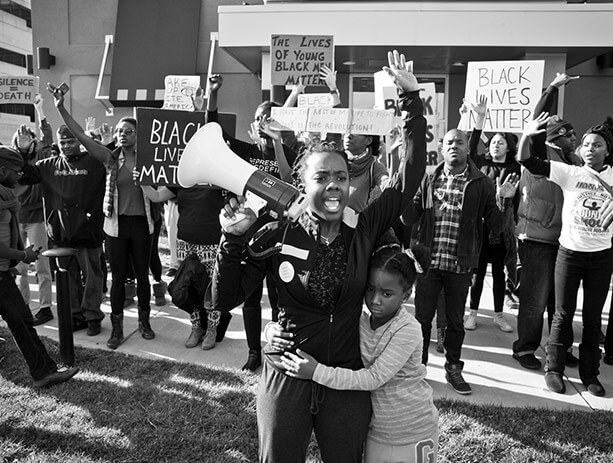The Brooklyn Magazine Guide To BAMcinemaFest, Week 2
The 2017 edition of BAMcinemaFest continues on through Sunday, June 25, and one thing you might notice in some of the festival’s second-week selections is the way they drew out certain thematic threads introduced in some of the films that have already played in its opening weekend. If The Force offered a sobering look at the challenges law enforcement has faced in recent years, Whose Streets? takes a look at civilians galvanized by what many of them feel is an example of police malfeasance. More internal culture clashes abound, with The Big Sick offering another example, after Columbus, of someone trying to negotiate the demands of his parents’ culture with his own deeply American desires. And consider Ana Asensio’s unbearably gripping debut feature Most Beautiful Island the bleak flip side to the relatively more optimistic view of illegal-immigrant life offered in Jim McKay’s En El Séptimo Día. It’s just further proof of how carefully and imaginatively curated BAMcinemaFest continues to be in bringing us the best and brightest of in American independent film.
Here are some films to especially watch out for during BAMcinemaFest’s second week.


Whose Streets?

While most major news outlets more or less abandoned the tragic story of the Michael Brown police shooting after a grand jury cleared his shooter, Darren Wilson, of civil-rights violations, Sabaah Folayan and Damon Davis stayed in Ferguson, Missouri, for much longer and came away with this galvanizing portrait of what is essentially the beginnings of the Black Lives Matter movement. Though the filmmakers’ sympathy for the black community is clear, Folayan and Davis wisely avoid the polemical route and filter their activist stance through the affecting personal stories of some of the residents finally roused to political action by Brown’s death. On-screen quotes from writers and thinkers like Maya Angelou and Frantz Fanon underscore the inevitability of this kind of collective action. But Whose Streets? is perhaps most valuable for the harrowing immediacy of the on-the-ground footage—whether captured by the filmmakers themselves or by some of the Ferguson residents via digital cameras and smartphones—it shows us. Folayan and Davis’s film is a call to action, yes, but it accomplishes its goals with a minimum of political grandstanding and a wealth of human detail. (Screens June 19, 7 p.m., followed by Q&A with Folayan and Davis, moderated by Touré; Magnolia Pictures will release the film on August 11)


The Big Sick

The mysterious disease that strikes Emily (Zoe Kazan), laying her low in a medically induced coma as doctors scramble to figure out what’s ailing her, is only the tip of the iceberg for what Kumail Nanjiani—who not only plays a version of himself, but also co-wrote the autobiographical screenplay with his wife, Emily V. Gordon—aims to explore in Michael Showalter’s comedy-drama. The Big Sick is, on the surface, a romance between Kumail and Emily, one with many bumps on the road, to put it mildly. But it also chronicles Kumail’s own coming-of-age, professionally and personally. Like Jin in Columbus, Kumail wages a persistent cultural war inside himself, as his desire to please his traditional Pakistani parents clashes with his more American yearning to live life on his own terms. More subtly, though, it also details Kumail’s evolution as a comedian. Early on in the film, after Kumail performs a one-man show he’s been working on about his native Pakistan, Emily is the only one brave enough to offer actual criticism: that a crucial personal element was missing to what mostly felt like a dry history lesson. Though it plays as a throwaway moment in context, in hindsight that bit of creative wisdom resounds through even the shaggiest of detours in The Big Sick. By the end of this sometimes clumsy yet always heartfelt film, Kumail has become not just a more mature person, but a more incisive comedian as well, drawing from his own personal experiences and observations in ways that eluded him earlier. (Screens June 21, 6:45 p.m., followed by Q&A with Showalter, Nanjiani, Gordon, Holly Hunter, Ray Romano, Anupam Kher, and producer Barry Mendel; Amazon Studios and Lionsgate will release the film on June 23)


Most Beautiful Island

There’s precious little beauty in the life of Luciana (Ana Asensio), an undocumented Spanish immigrant whose struggles to make ends meet in New York lead her to take on a series of odd jobs—including participating in a sadistic game of chance that offers a payout of $2,000 if she survives the night. The first half of Asensio’s writing/directing debut operates in a familiar mode of gritty realism, observing the at-times-brutal particulars of Luciana’s day-to-day life with unsparing pseudo-documentary detachment. But when Luciana gets roped into that deadly game, Most Beautiful Island shifts into full-on thriller mode in its second half, with Asensio showing a sure hand in generating white-knuckle tension through silences and gestures within a claustrophobic setting. The world of Most Beautiful Island may be bleak, but Asensio allows for moments of warm camaraderie and quiet heroism even amid an existence driven almost wholly by self-preservation. Luciana may be forced to return to the darkness in the end, but at least she does so with her sense of humanity intact. (Screens June 21, 9:45 p.m., preceded by Tyler Rubenfeld’s short film Innards, and followed by Q&A with Asensio; currently without distribution)


Marjorie Prime

In adapting Jordan Harrison’s 2014 play to the screen, writer/director Michael Almereyda hasn’t really bothered to hide its stage origins, as much of Marjorie Prime is composed of conversations between characters, with no attempts to artificially open out the action. That is hardly a criticism in this case, though, as Almereyda, with the help of cinematographer Sean Williams’s antiseptic images and Mica Levi’s nervy score, is able to conjure and sustain a stark, eerie mood wholly appropriate to its futuristic meditation on the manipulatability of memory and its troubling moral implications. Still, for all of Almereyda’s subtle cinematic virtuosity, it’s the actors that ultimately carry the day here: from Lois Smith’s irascibility and yearning as Marjorie, still grieving the death of her husband Walter; and Jon Hamm’s uncanny mix of warm curiosity and cold automatism as Walter Prime, a robotic younger version of Walter created to keep Marjorie company; to Geena Davis’s poignant ambivalence as Marjorie’s daughter, Tess, disturbed by the sheer concept of a “prime” yet also working through familial traumas of the past. Here is one sci-fi film in which the science fiction isn’t allowed to overwhelm the anguished humanity at its heart. (Speaking of science fiction, Marjorie Prime is the first of two Almereyda films screening at BAMcinemaFest this year; the second is Escapes, a documentary about Hampton Fancher—best known for co-writing Blade Runner—that receives its world premiere on June 24.) (Screens June 22, 7 p.m., followed by Q&A with Almereyda; FilmRise will release the film on August 18)


Ingrid Goes West

Ingrid Thorburn, the needy, self-absorbed main character of Matt Spicer’s black comedy, may be an extreme example of a millennial mind warped by the narcissistic pitfalls of social media and the falsity of the images they can project. But Aubrey Plaza, the actress who plays her, heroically refuses to condescend to her, just as Spicer never allows Ingrid Goes West to lapse into an easy technophobic cautionary tale. Though Ingrid is the type of person to confuse likes and comments on Instagram for actual human friendship, Plaza allows us to glimpse the inner desire for connection underpinning her behavior, inviting us to sympathize with her even as we marvel at her deadpan sociopathy. It’s a high-wire performance of dazzling, disturbing complexity, but Plaza’s triumph might not have been possible without Spicer backing her up with a screenplay that sees, with uncompromising clarity, the humanity in every single character: not just Ingrid, but also her latest victim, Taylor Sloane (Elizabeth Olsen), who, for all her undeniable charms, is, at heart, merely a more benign version of Ingrid. Spicer is so sharply observant of his characters’ emotional nuances, and his performers so committed to bringing them to authentic, empathetic life, that against all odds, you may find yourself implicated in these characters’ actions—enough, at least, to force you to rethink your own relationship to social media. (Screens June 23, 7 p.m., preceded by Kevin Byrnes’s short film Harvest, and followed by Q&A with Spicer and Billy Magnussen; NEON will release the film in theaters on August 11)


Golden Exits

Featuring seven major characters whose lives interconnect during the course of a summer, Alex Ross Perry’s latest film is his most ambitious to date—and quite possibly his best. Golden Exits is nothing less than a grandly panoramic view of marriage, family and interpersonal relationships, and Perry’s film recalls those of Eric Rohmer in the searing clarity with which he sees his characters’ fragilities, penetrating the walls these characters build through their carefully chosen words in order to glimpse the complex human beings underneath. There’s a certain anthropological fascination in seeing the way the presence of a seemingly innocent yet ultimately elusive Australian woman (Emily Browning) quietly destabilizes the lives of those around her, bringing out a panoply of buried resentments, all of which the characters react to in their own ways. But there’s also beauty, too: the beauty of Sean Price Williams’s 16mm cinematography, of Keegan DeWitt’s melancholic chamber score, of the way Perry orchestrates his roundelay to generate a visceral feeling of the walls gradually closing in on his characters. Golden Exits may be cynical in its view of relationships built on a foundation of lies, compromises and suppressed desires, but its cynicism carries with it the revelatory force of closely observed, hard-fought wisdom. (Closing Night screening June 24, 7:30 p.m., followed by Q&A with Perry; currently without distribution)
You might also like 




















